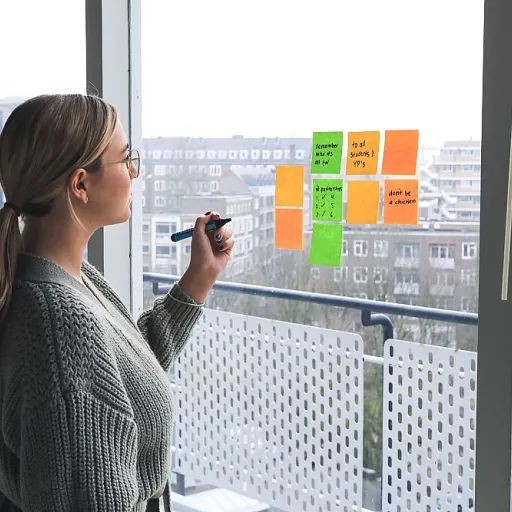
Understanding the role of group therapy check in questions in the workplace
Why Check In Questions Matter in the Workplace
Group therapy check in questions, often used in therapy sessions and addiction recovery, are gaining traction as a tool for employee engagement. These questions help teams build trust, encourage openness, and foster a supportive environment. When adapted for the workplace, check ins can transform regular meetings into opportunities for personal growth and team building.
In a professional setting, check in questions serve as icebreakers and conversation starters. They invite participants to share thoughts, feelings, or recent experiences, which can lead to deeper connections and improved mental health. This approach is rooted in the same principles that make group therapy effective: creating a safe space for honest communication and mutual support.
Connecting Group Therapy Practices to Team Engagement
Many organizations are recognizing the value of integrating therapy-inspired check questions into their work routines. These questions help team members reflect on their personal goals, coping strategies, and even favorite moments from the week. Over time, this practice supports long term recovery from stress and burnout, while also promoting personal development and resilience.
By encouraging employees to participate in regular check ins, leaders can help teams explore ideas, address challenges, and celebrate progress. This not only boosts morale but also strengthens the sense of belonging within the group. For those interested in creative approaches to team building, exploring unique team building activities can further enhance engagement and collaboration.
- Check in questions can be adapted for different team dynamics, whether in-person or remote.
- They support mental health by providing space for honest discussion and emotional recovery.
- Regular use of check questions in meetings helps normalize open communication and support among team members.
Ultimately, integrating group therapy check in questions into the workplace is about more than just asking questions. It’s about fostering a culture where everyone feels heard, valued, and supported in their personal and professional journey.
Building trust and openness among team members
Creating a Safe Space for Honest Conversations
Building trust and openness among team members is essential for any group aiming to improve employee engagement. Group therapy check in questions can play a significant role in this process. When team members regularly participate in check ins, they gradually feel more comfortable sharing their thoughts and emotions. This sense of safety encourages honest conversations, which are the foundation of strong team relationships.
Why Trust Matters in Team Settings
Trust is not just a buzzword in the workplace. It is a critical factor in mental health, personal growth, and effective collaboration. When employees trust each other, they are more likely to support one another, share ideas, and work towards common goals. Group therapy techniques, such as icebreaker questions and thought provoking check questions, help break down barriers and reduce feelings of isolation. This is especially important for teams dealing with high stress, addiction recovery, or significant change.
- Icebreaker questions can help participants get to know each other beyond work roles.
- Personal check in questions encourage team members to share their current mental state or coping strategies.
- Therapy questions can be adapted to explore personal development or recovery goals.
Encouraging Openness Through Routine Check Ins
Making check ins a regular part of meetings signals to employees that their well-being matters. Over time, this routine helps normalize discussions about mental health, stress, and even addiction recovery. When team members see that others are willing to share, they are more likely to open up themselves. This creates a cycle of support and openness that benefits both individuals and the group as a whole.
For teams looking for creative ideas to foster engagement and trust, incorporating engaging Halloween activities for the workplace can serve as a fun icebreaker and help participants connect on a personal level.
Supporting Long Term Team Building
Trust and openness are not built overnight. Consistent use of group therapy check in questions, whether in therapy sessions or regular team meetings, supports long term personal development and team building. As participants become more comfortable, they are more likely to share favorite coping strategies, discuss challenges, and celebrate recovery milestones together. This ongoing support is vital for maintaining engagement and achieving collective goals.
Examples of effective group therapy check in questions for teams
Practical check in questions for meaningful team conversations
When teams gather for a meeting, starting with group therapy check in questions can set a supportive tone. These questions help participants open up, share personal insights, and build trust. The right check in questions encourage team members to reflect on their mental health, work goals, and personal growth. They also create space for recovery and coping strategies, which are essential for long term engagement and well-being.
- Icebreaker questions: Simple prompts like “What’s your favorite way to recharge after work?” or “Share one thing that made you smile this week.” These help break the ice and make everyone feel included.
- Thought provoking questions: Ask, “What’s one challenge you’re currently facing at work?” or “Is there a recent success you’d like to celebrate with the group?” These questions explore both personal and professional experiences, supporting mental health and personal development.
- Team building questions: Try, “How can the team support you this week?” or “What’s one idea you have to improve our next meeting?” These questions help foster a sense of support and collective goals.
- Therapy-inspired check ins: For teams dealing with high stress or recovery from setbacks, consider questions like, “What coping strategies are helping you manage stress?” or “How are you taking care of your mental health lately?” These are adapted from group therapy and addiction recovery sessions, focusing on well-being and resilience.
- Personal growth questions: Prompts such as “What’s a skill you’d like to develop this quarter?” or “Share a recent learning moment.” These encourage ongoing development and engagement.
It’s important to adapt these check questions to the group’s needs and the meeting’s context. For example, in a therapy session or couples therapy setting, questions might focus more on emotional support and recovery. In a work context, they can be tailored to team goals and professional growth. The key is to create a safe space where team members feel comfortable sharing.
For organizations looking to strengthen employee engagement, celebrating the role of HR professionals in facilitating these check ins is crucial. HR can help guide therapy questions, support group dynamics, and ensure that check ins become a regular part of team meetings. This approach not only boosts engagement but also supports mental health and personal development across the organization.
Adapting check in questions for different team dynamics
Tailoring Check In Questions for Every Team
Every group is unique, and so are the dynamics that shape team engagement. When using group therapy check in questions at work, it’s important to adapt your approach to fit the personalities, roles, and goals of your team members. The right questions help participants feel included and supported, whether you’re focusing on mental health, personal growth, or team building.- Consider the team’s familiarity: For new teams or those with recent changes, start with simple icebreaker questions. These can be as light as “What’s your favorite way to unwind after work?” or “Share one personal goal for this week.” As trust builds, you can introduce more thought provoking or therapy-inspired questions.
- Account for the work environment: Remote teams may benefit from check ins that explore how participants are coping with isolation or balancing recovery from stress. In-person teams might focus on support and collaboration, using questions like “What’s one way a colleague helped you this week?”
- Adapt for specific challenges: If your team is dealing with high stress, burnout, or even addiction recovery, tailor your check questions to address coping strategies and mental health. For example, “What’s one coping strategy that helped you this month?” or “How can the group support your recovery or personal development?”
- Mix up the format: Some meetings may benefit from open-ended therapy questions, while others work better with quick check ins or even group activities. Try rotating between personal and work-related questions to keep engagement high.
Ideas for Different Team Dynamics
| Team Type | Sample Check In Question | Purpose |
|---|---|---|
| New Teams | "What’s one interesting fact about you that most people don’t know?" | Icebreaker, build trust |
| Project Teams | "What’s a recent work challenge you overcame?" | Support, share coping strategies |
| Teams in Recovery or High Stress | "What’s one thing you’re doing for your mental health this week?" | Mental health, addiction recovery support |
| Long Term Teams | "How have your personal or professional goals changed over time?" | Personal growth, reflection |
| Couples Therapy or Small Groups | "What’s one way your partner or teammate supported you recently?" | Relationship building, gratitude |
Tips for Effective Adaptation
- Rotate questions to keep meetings fresh and engaging.
- Encourage voluntary sharing—never force participation.
- Use feedback from participants to refine your check in approach.
- Remember, the goal is to foster openness, support, and personal development within the group.
By adapting group therapy check in questions to your team’s unique needs, you help create a supportive environment where everyone can thrive, whether you’re focusing on mental health, addiction recovery, or simply building stronger connections at work.
Overcoming resistance and making check ins a habit
Turning Check Ins into a Consistent Team Practice
Building a habit of regular check ins can be challenging, especially if your team is new to group therapy techniques or hesitant to share personal thoughts at work. Resistance is common, but it can be addressed with empathy and clear communication.- Normalize the process: Explain that check in questions are a tool for support, not judgment. Emphasize their role in mental health, team building, and personal development.
- Start with simple icebreaker questions: Begin meetings with light, non-intrusive questions. For example, "What was your favorite moment this week?" or "Share one thing that made you smile recently." This helps participants ease into the process.
- Model openness: Leaders and facilitators should answer check questions honestly. This sets the tone and shows that sharing is safe and valued.
- Respect boundaries: Make it clear that no one is forced to share more than they are comfortable with. Voluntary participation builds trust over time.
- Connect questions to team goals: Use thought provoking questions that relate to work, recovery from setbacks, or coping strategies. For example, "What is one personal goal you’re working on this month?" or "How can the group help you with a current challenge?"
- Rotate facilitators: Let different team members lead check ins. This encourages ownership and brings fresh ideas to therapy sessions.
Addressing Common Barriers
Some team members may associate group therapy or check ins with addiction recovery or couples therapy, which can create discomfort. Clarify that these questions are adapted for the workplace to foster connection, not to diagnose or treat mental health conditions. If you notice reluctance, try these approaches:- Introduce check ins gradually, perhaps once a week at first.
- Share examples of how check questions have helped other teams improve communication and support.
- Solicit feedback from participants about which questions meetings feel most helpful or engaging.
Measuring the impact of check in questions on employee engagement
Tracking Progress and Engagement Shifts
Measuring the impact of group therapy check in questions on employee engagement is essential for understanding their true value in the workplace. When teams regularly use check ins—whether as icebreaker questions at the start of a meeting or as deeper therapy questions in ongoing group sessions—leaders can observe changes in team dynamics, mental health, and overall work satisfaction.Key Indicators to Monitor
To assess the effectiveness of check in questions, consider tracking these indicators:- Participation Rates: Are more team members actively sharing during check ins or therapy sessions?
- Quality of Responses: Are participants moving from surface-level answers to more personal, thought provoking insights?
- Feedback: Do team members report feeling more supported or connected after regular check ins?
- Meeting Atmosphere: Has the tone of meetings shifted to be more open, positive, or collaborative?
- Recovery and Coping: Are employees using coping strategies discussed in check ins to manage stress or work challenges?
Methods for Gathering Insights
There are several ways to collect data on the impact of group therapy check in questions:- Surveys: Use short, anonymous surveys to ask about the perceived benefits of check ins, favorite questions, or suggestions for improvement.
- Observation: Leaders or facilitators can note changes in engagement, participation, and group support during meetings.
- Personal Development Goals: Encourage team members to set and share personal growth or mental health goals, then check progress over time.
- One-on-One Conversations: Private check ins can help uncover individual perspectives on how group therapy sessions are helping with work, addiction recovery, or personal challenges.













